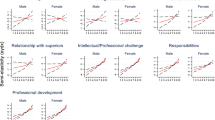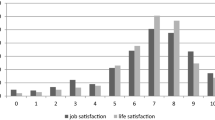Abstract
This study investigates the relationship among college quality, earnings, and job satisfaction among a recent cohort of college graduates. Our results suggest that, controlling for earnings, college quality is negatively related to job satisfaction, especially to those aspects of the job that are associated with monetary rewards. Further analysis indicates that there is no significant difference between the male and female groups; however, the negative relationship between satisfaction with monetary rewards and college quality is mainly driven by the non-white group. These findings do not support the view that graduating from elite schools will necessarily lead to greater job satisfaction.
Similar content being viewed by others
References
Argyle M (1999) Causes and correlates of happiness. In: Kahneman D, Diener E, Schwarz N (eds) Well-being: the foundation of hedonic psychology. Sage, New York, pp 353–373
Behrman JR, Birdsall N (1983) The quality of schooling: quantity alone is misleading. Am Econ Rev 73(5):928–947
Bertrand M, Mullainathan S (2001) Do people mean what they say? Implications for subjective survey data. Am Econ Rev 91(2):67–72
Bisconti A, Solmon L (1977) Job satisfaction after college: the graduates’ viewpoint. CPC Foundation, Bethlehem
Black DA, Smith JA (2004) How robust is the evidence on the effects on college quality? Evidence from matching. J Econom 121:99–124
Black DA, Smith JA (2006) Estimating the returns to college quality with multiple proxies for quality. J Labor Econ 24(3):701–728
Blanchflower D, Oswald AJ (2004) Well-being over time in Britain and the USA. J Public Econ 88(7–8):1359–1386
Bound J, Johnson G (1992) Changes in the structure of wages in the 1980s: an evaluation of alternative explanations. Am Econ Rev 83:371–392
Brewer D, Ehrenberg R (1996) Does it pay to attend an elite private college? Evidence from the senior class of 1980. Res Labor Econ 15:239–272
Brewer D, Eide E, Ehrenberg R (1999) Does it pay to attend an elite private college? Cross cohort evidence on the effects of college type on earnings. J Hum Resour 34(1):104–123
Dale SB, Krueger AB (2002) Estimating the payoff to attending a more selective college: an application of selection on observables and unobservables. Q J Econ 117(4):1491–1527
Di Tella R, MacCulloch RJ, Oswald AJ (2003) The macroeconomics of happiness. Rev Econ Stat 85(4):809–827
Diener E (1984) Subjective well-being. Psychol Bull 95(3):542–575
Easterlin RA (1974) Does economic growth improve the human lot? In: David PA, Reder MW (eds) Nations and households in economic growth: essays in honor of moses abramovitz. Academic, New York
Easterlin RA (1995) Will raising the incomes of all increase the happiness of all? J Econ Behav Organ 27:35–47
Easterlin RA (2003) Income and happiness: towards a united Theory. Econ J 111:465–484
Eide E, Brewer DJ, Ehrenberg RG (1998) Does it pay to attend an elite private college? Evidence on the effects of undergraduate college quality on graduate school attendance. Econ Educ Rev 17(4):371–376
Fox M (1993) Is it a good investment to attend an elite private college? Econ Educ Rev 12(2):137–151
Frey BS, Stutzer A (1999) Measuring preferences by subjective well-being. J Inst Theor Econ 155:1–24
Ganzach Y (1998) Intelligence and job satisfaction. Acad Manage J 41(5):526–539
Gerhart B (1987) How important are dispositional factors as determinants of job satisfaction? Implications for job design and other personnel programs. J Appl Psychol 72:366–373
Glenn ND, Weaver CN (1982) Further evidence on education and job satisfaction. Soc Forces 61(1):46–55
Gordon ME, Arvey RD (1975) The relationship between education and satisfaction with job content. Acad Manage J 18(4):175–180
Heckman J (1979) Sample selection bias as a specification error. Econometrica 47:153–161
Judge TA, Cable DM, Boudreau JW, Bretz RD (1995) An empirical investigation of the predictor of executive career success. Pers Psychol 48:485–519
Katz L, Murphy K (1992) Changes in relative wages, 1963–1987: supply and demand factors. Q J Econ 107:35–78
Kolenikov S, Angeles G (2004) The use of discrete data in principal component analysis: Theory, simulations, and applications to socioeconomic indices. Working Paper of MEASURE/Evaluation project, WP-04-85, Carolina Population Center, University of North Carolina
Levy F (1998) The new dollars and dreams. Sage, New York
Levy F, Murnane R (1992) U.S. earnings levels and earnings inequality: a review of recent trends and proposed explanations. J Econ Lit 30(3):1333–1381
Murphy K, Welch F (1989) Wage premiums for college graduates: recent growth and possible explanations. Educ Res 18:17–26
Muthen BO (1989) Dichotomous factor analysis of symptom data. Social Methods Research 18:19–65
Myers DG (1992) The pursuit of happiness: who is happy and why. Morrow, New York
Ochsne N, Solmon L (1979) College education and employment: the recent graduates. CPC Foundation, Bethlehem
Oswald AJ (1997) Happiness and economic performance. Econ J 107:1815–1831
Quinn R, Staines G (1979) The 1977 quality of employment survey. University of Michigan, Survey Research Center, Ann Arbor
Quinn R, Baldi de Mandilovitch M (1980) Education and job satisfaction, 1962–1977. Vocat Guid Q 29:100–111
Rumberger R, Thomas S (1993) The economic returns to college quality, major, and performance. Econ Educ Rev 12(1):1–19
Sharp L, Weidman J (1987) Early careers of undergraduate humanities majors. Paper presented at the meeting of the American Educational Research Association. Washington, DC
Solmon L, Bisconti A, Ochsner N (1977) College as a training ground for jobs. Praeger, New York
Stevenson B, Wolfers J (2007) The paradox of declining female happiness. University of Pennsylvania, Mimeo
Trusheim D, Crouse J (1981) Effects of college prestige on men’s occupational status and income. Res High Educ 14(4):283–304
Waller NG, Tellegen A, McDonald RP, Lykken DT (1996) Exploring non-linear models in personality assessment: Development and preliminary validation of a negative emotionality scale. J Pers 64(3):545–576
Weisbrod B, Karpoff P (1968) Monetary returns to college education, students ability, and college quality. Rev Econ Stat 50:491–497
Wise D (1975) Academic achievement and job performance. Am Econ Rev 65(3):350–366
Zhang L (2005) Does quality pay? Benefits of attending a high-cost, prestigious college. Routledge, New York
Author information
Authors and Affiliations
Corresponding author
Appendix
Appendix
Rights and permissions
About this article
Cite this article
Liu, X., Thomas, S. & Zhang, L. College Quality, Earnings, and Job Satisfaction: Evidence from Recent College Graduates. J Labor Res 31, 183–201 (2010). https://doi.org/10.1007/s12122-010-9086-1
Published:
Issue Date:
DOI: https://doi.org/10.1007/s12122-010-9086-1




